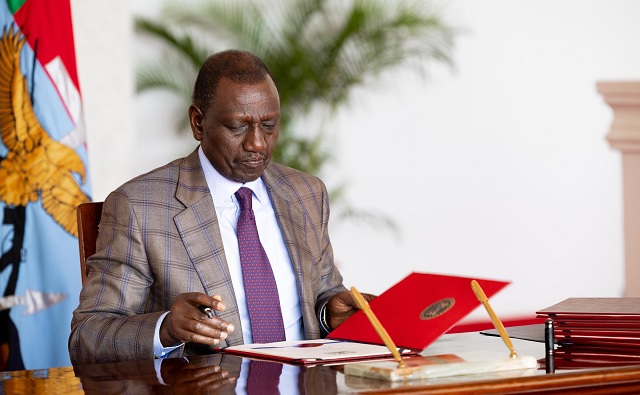
Why the Kenyan president may have opened the pandora’s box that will grievously impair his government
THE LAST WORD | Andrew M. Mwenda | Many people have hailed President William Ruto of Kenya for yielding to popular pressure not to sign the controversial Finance Bill. A friend in diplomatic circles in Kampala texted me saying that Ruto should be awarded a Nobel Peace Prize. In my young and idealistic life, I would have hailed the Kenyan president in the same way. Indeed, if Ruto was a priest, it would have been a good move in the church. Such a gesture would have shown that he cares about the feelings of his parishioners. Yet in politics, it is a risky gamble to cave-in to pressure from protesters on the street. Why?
When people protest, it is rarely over one issue. In the specific case of Kenya, people have many grievances: joblessness, ethnic animosities, political differences, social frustration, psychological insecurity, etc. Supporters of Raila Odinga claim Ruto stole the last election. Thus, although the protests were sparked by the Finance Bill, this was only a rallying cry. When thousands of Kenyans took to the streets, their demands were certainly going to be more than the withdrawal of the Finance Bill.
It is impossible to satisfy the demands of an angry public. Ruto knows, or should have known, that withdrawal of the Bill would not end the protests. It would only make his enemies “smell blood” i.e. spot a weakness and seek to exploit his vulnerability. Indeed, those who lost in the 2002 election will seek to use these protests to force Ruto out of office. Inside his own governing coalition, there are those, like his deputy president, who want his job. All these are sharks waiting to grab power for themselves.
First, Kenya is a highly indebted country. The ratio of its debt to total economic output (GDP) is 70%, while debt service consumes 63% of public revenue, 59% of the budget. In March of this year, Kenya was almost defaulting on her debt, its currency was plummeting. It was only saved by raising $1.5 billion on its Eurobond and money from the World Bank and IMF. Kenyan needs to raise more revenues to pay its debts. And this cannot be achieved without making many people angry. The Finance Bill is therefore necessary for Kenya to get out of its current fiscal crisis.
Given these circumstances, and given his long experience in politics, including in organising protests (both peaceful and violent) I thought Ruto would be best equipped to handle this crisis. Many Kenyans expressed disapproval of the Finance Bill by protesting on the streets and mobilising on social media. Government held consultations with different stakeholders and consequently, some proposed taxes such as those on diapers, on women menstrual products and on bread – were removed. Despite these compromises, Kenyans continued to oppose the Bill. When parliament passed the Bill, action on the streets reached its apogee.
Hence, on June 25 protesters shut down Nairobi, forced their way into parliament where they chased legislators and destroyed property. On the streets, they burnt vehicles, looted shops and stoned the police.
Ruto went on television and declared these acts criminal. This was the right position to take. By removing some of the contentious taxes from the Bill, the government of Kenya had shown its willingness to negotiate and compromise. By continuing to protest, these Kenyans showed they wanted all or none. By turning violent, they provided the state with justification to clump down heavily on them. Therefore, Ruto was in a strong position.
I do not know the internal workings of the Kenyan state. For instance, I do not know how much loyalty Ruto enjoys in the intelligence, police and military apparatus. I also do not know how much political clout he has inside his own governing coalition. It seems he has fallen out with his deputy president, who represents the powerful Kikuyu constituency. If Ruto was forced to resign, his deputy would take over. Watching him speak on television, Rigathi Gachagua seemed to me like a man willing to add fuel to an already burning infernal. Is Ruto safe? All these factors would have shaped his analysis of the situation and therefore his response.
Nonetheless, I think his capitulation to the protest is a risky gamble. In politics, it’s always important to initiate reform at a time and point of your choosing, not under pressure. When people press you hard, listen to them but stand your ground. Ensure that you withstand the storm. Once you have held and the protests have been contained, you can now press ahead with your agenda while at the same time making reasonable accommodations in line with public demand. The point is not to be seen as weak and flip-flopping. In politics, as in the military, perception is very important.
Ruto was passionate about the Finance Bill, convinced it was necessary for Kenya’s future. He was also convinced that protestors had crossed the line when they turned violent. Why then did he withdraw the Bill and address violent mobs as democratic protestors in one day? When you yield to pressure, your opponents see a vulnerability. Rather than end their protests, they are incentivised to demand more. And this is what is happening in Kenya right now. Although Ruto has withdrawn the entire Bill, the protesters have shifted goalposts and are demanding his resignation. As I write this article, they are planning and mobilising a march on State House. I will be surprised if they do not follow up their June 26 victory.
The current crisis in Kenya demonstrates the weakness and cracks in Ruto’s governing coalition. For instance, didn’t the intelligence and police services make an informed estimate for the scale and scope of popular discontent about this Bill? The protesters were using social media to communicate their anger and plans. This is called open-source intelligence. All the intelligence services needed to do is follow chatter on social media to make an estimate of the anger. If they did, couldn’t they have put in place counter measures to either nip these protests in the bud or contain them on the street?
This is a critical moment for Kenya. That country is not going to solve its current fiscal problems without making policies that will annoy one group or another. None of the social groups that will have to suffer the cost of paying off this debt is going to do so willingly. Therefore, Ruto and those who succeed him must know that they must make hard choices and stick to them.
*****

amwenda@ugindependent.co.ug
 The Independent Uganda: You get the Truth we Pay the Price
The Independent Uganda: You get the Truth we Pay the Price




I guess I understand why he made the concessions, especially the withdrawal of the Finance Bill.
Ruto carries the 2007/2008 post-election baggage, so he has to tread rather carefully the slippery grounds. I also guess some of those creating the mayhem are taking advantage of this fact. Nonetheless, nobody is going to take power from him, for sure. Were I Gachagua, I’d be pretty careful. It is claimed he is among those behind the mayhem. But he has to understand that Ruto is a very clever and dangerous person. If the so-called protesters persist in their criminality, despite his concessions and willingness to talk with them, he may come down hard on them, including the DP.
Comparing kenya politics to that of uganda is like comparing light and darkness. Kenya to some extent is democratic , The people have a say on how they’re governed, You can not forces policies down the throat of citizen. M7 can stamp his authority to Ugandans they he wishes because he is almost the symbolic king of that country. I wish you could visit some of this democratic countries and do some bench marking it may help you in your future articles especially those touching on democracy.
You mean Ruto should learn from Museveni who orders courts to remand some Ugandans that demand for the resignation of Anita Among, the most corrupt, incompetent and arrogant speaker the Uganda parliament ever had? Not in Kenya. They are way beyond the bottom billion and can have a say in the country unlike very poor and automatic Uganda under Museveni family rule.